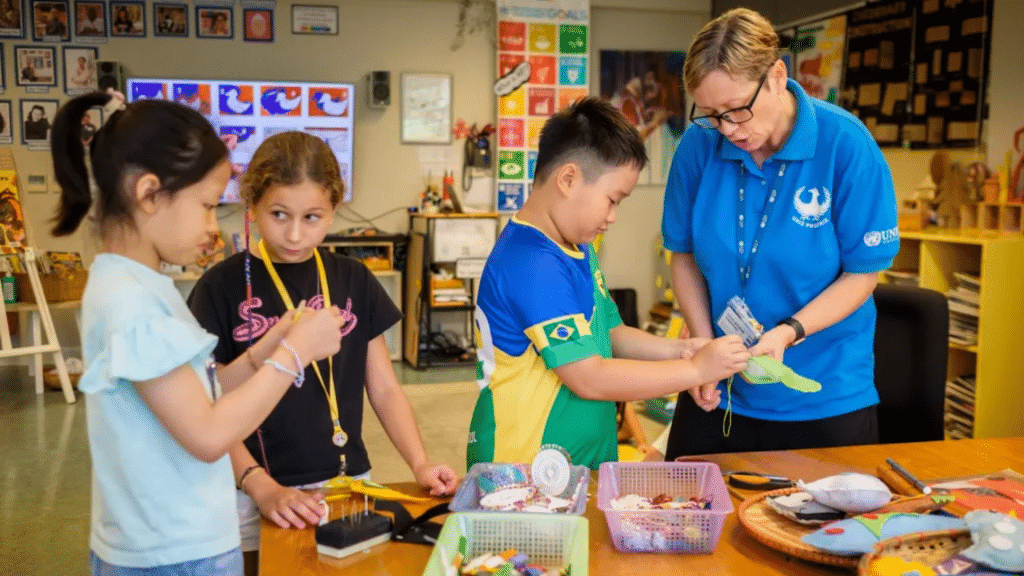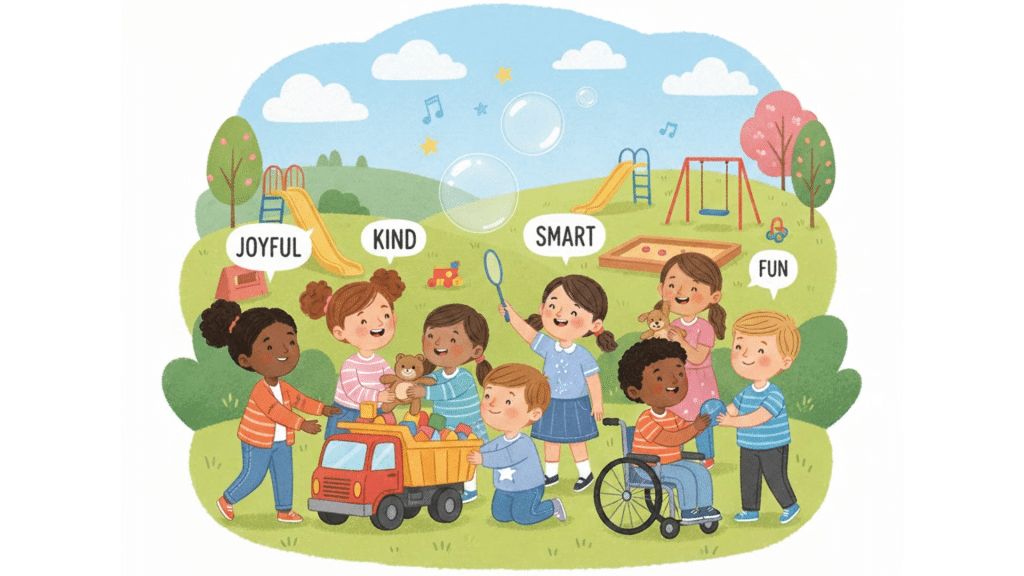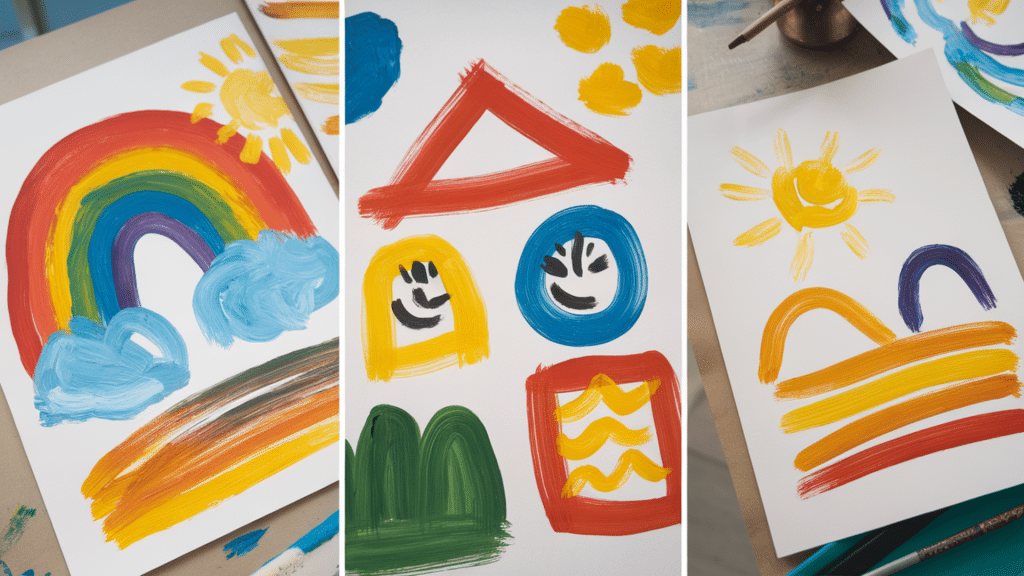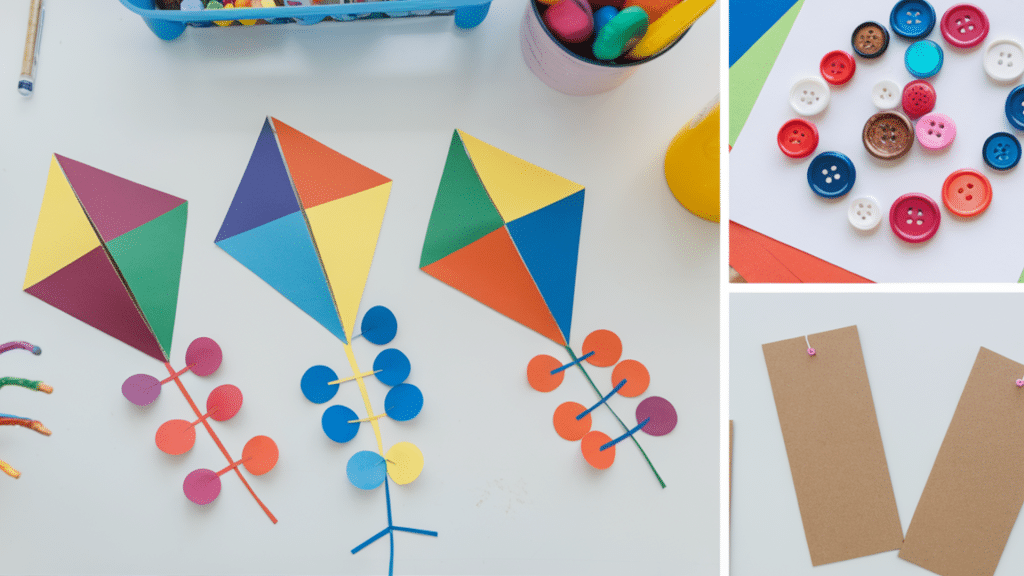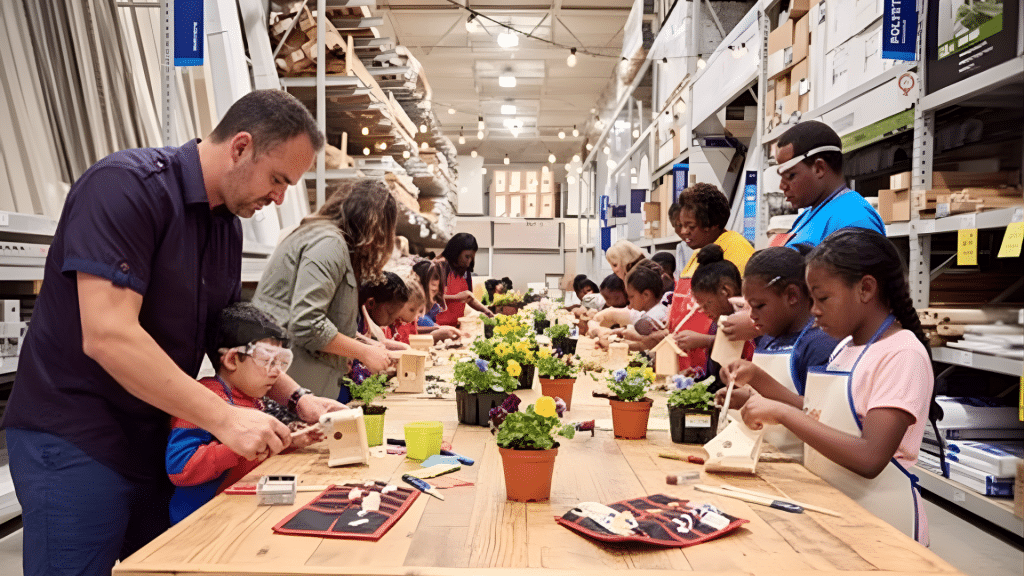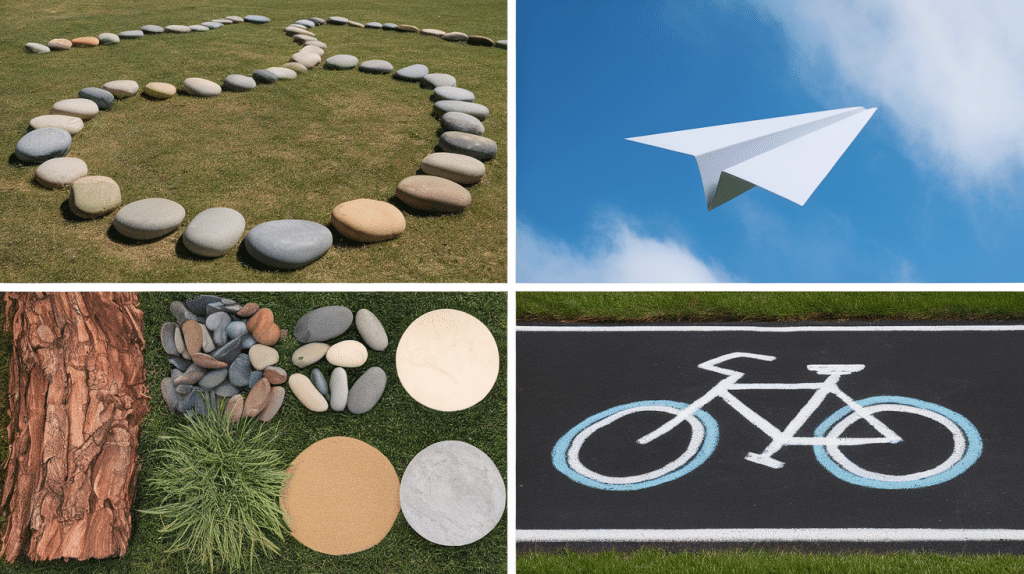As a parent, I know how important it is to prepare children for more than just schoolwork. Grades and routines matter, but life skills give kids the tools to handle real-world challenges with confidence.
From problem-solving to empathy, these everyday lessons shape how children grow into independent and responsible adults.
I’ve seen how small steps, like teaching kids to manage time or care for their belongings, can make a lasting difference. Life skills aren’t taught in a single day – they’re learned little by little through daily practice.
In this blog, you’ll find practical ideas, age-based skills, and simple strategies to guide children at every stage. Together, we can make learning part of everyday life.
Importance of Teaching Life Skills
Teaching life skills gives children a strong foundation for growth.
These skills build independence, adaptability, and self-reliance while preparing kids for adulthood. They also improve awareness and help children develop habits they will use throughout life.
Practical daily lessons like hygiene, safety, and money management give children the confidence to handle responsibilities on their own.
Emotional and social skills such as empathy, teamwork, and communication strengthen friendships, reduce conflicts, and improve family relationships.
Life skills also prepare kids for school and adulthood. Time management, chores, and decision-making encourage responsibility and smoother transitions into academics and careers.
By practicing these skills, children gain resilience, confidence, and balance, which support long-term success, independence, and overall well-being.
Life Skills to Teach Kids
Children learn age-appropriate skills step by step, building independence, responsibility, and confidence as they grow.
Core Life Skills
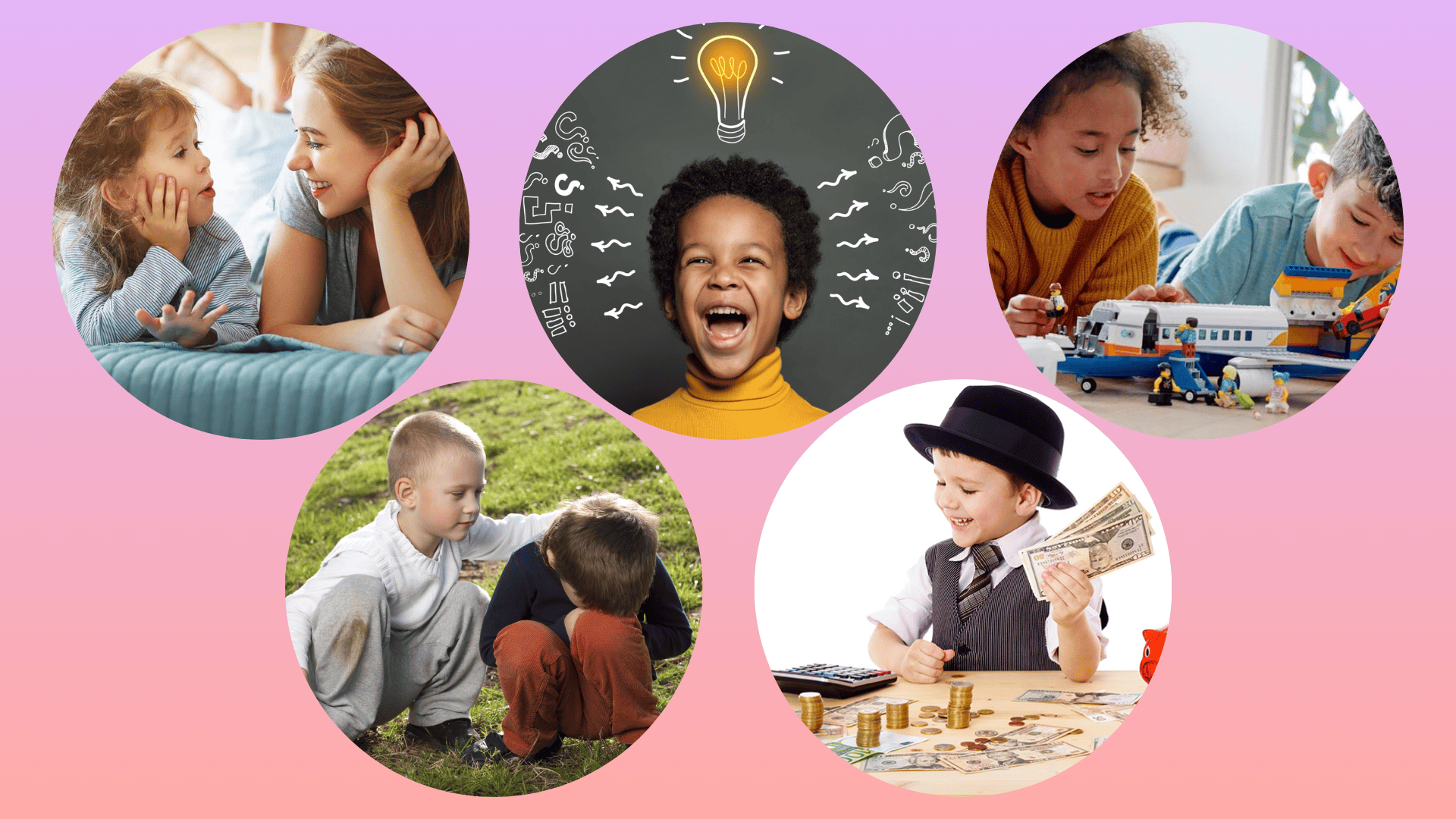
Essential everyday skills that help kids grow confident, independent, and prepared for life.
- Communication: Learning to express thoughts, feelings, and needs clearly helps children connect with others. Like telling a parent why they feel sad instead of crying.
- Decision-Making: Making choices teaches responsibility. For example, choosing to finish homework before playing shows how prioritizing important tasks brings good results.
- Problem-Solving: Finding solutions builds confidence and resilience.
For example, fixing a broken toy with tape teaches persistence, creativity, and the value of trying different approaches. - Critical Thinking: Asking questions develops curiosity and a deeper understanding. For example, wondering why the sky changes color encourages investigation and looking for real answers.
- Empathy: Recognizing emotions in others builds kindness and stronger relationships.
For example, comforting a sad friend shows compassion and how support strengthens bonds. - Self-Care: Maintaining hygiene and routines builds independence.
For example, brushing teeth daily without reminders teaches discipline and lifelong healthy habits. - Money Management: Learning to save and spend wisely builds financial awareness.
For example, saving allowance for a toy teaches patience, discipline, and the value of waiting. - Time Management: Balancing tasks helps avoid stress and build productivity.
For example, reading before bed helps children finish responsibilities and still enjoy free time. - Resilience: Recovering from setbacks teaches perseverance. For example, losing a board game but trying again shows that failure is temporary and effort leads to growth.
- Collaboration: Working with others teaches teamwork and respect. For Example, building a block tower with siblings highlights listening, sharing ideas, and contributing fairly to group success.
Early Children of the 2-4 Age Group
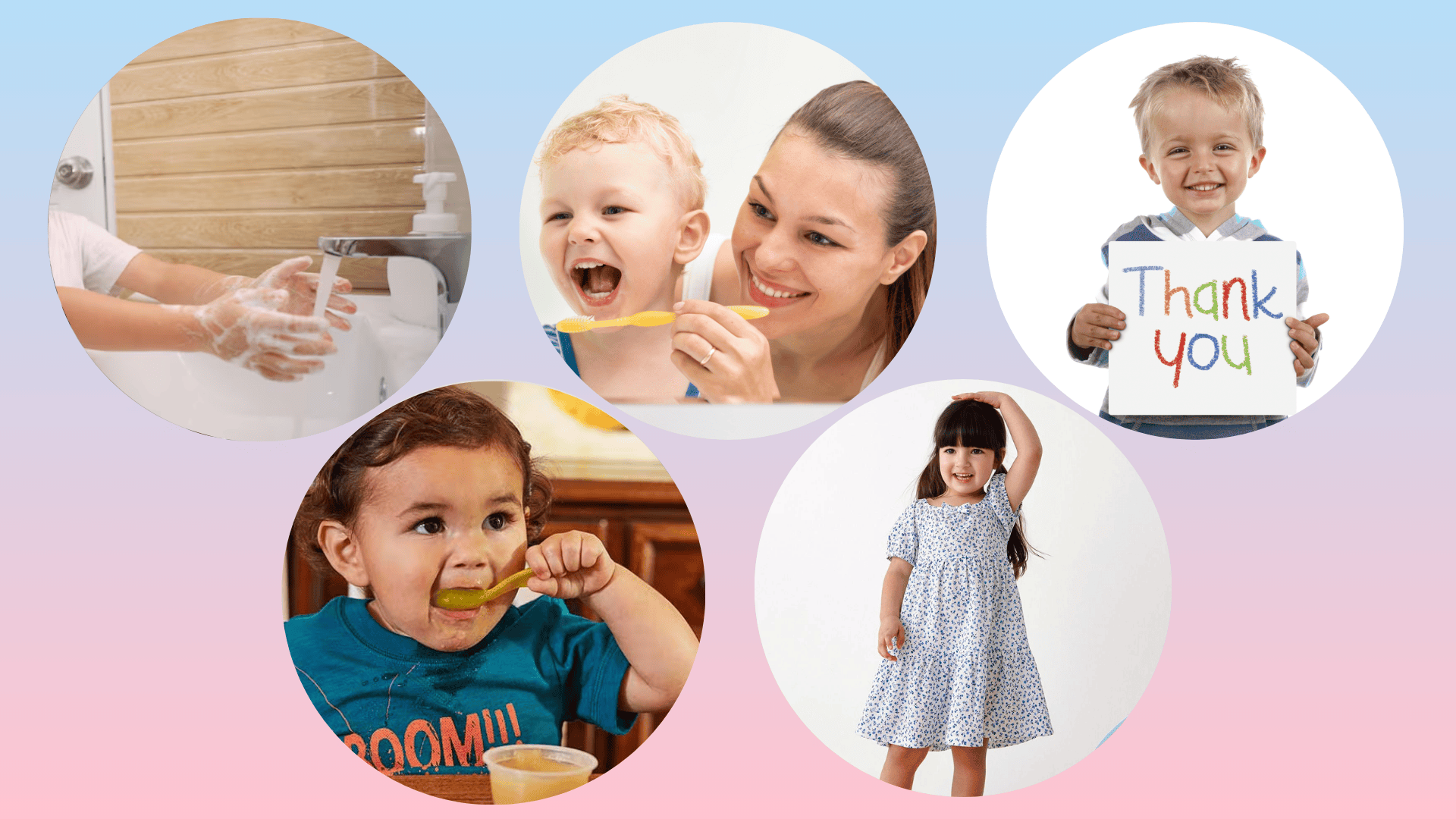
Toddlers start with simple routines that teach hygiene, sharing, manners, and responsibility in playful, everyday ways.
- Washing Hands: Learning to wash hands after using the bathroom builds hygiene awareness.
Example: proper handwashing stops germs from spreading and creates a safe daily habit. - Brushing Teeth with Help: Starting oral care early builds responsibility.
Example: brushing in the morning and night helps teach routine and the value of healthy habits. - Putting Toys Away: Tidying up teaches respect and organization. Example: putting blocks back before dinner shows responsibility and helps keep the home clean.
- Sharing Toys: Sharing builds kindness, patience, and cooperation. Example: taking turns on a swing teaches fairness, empathy, and care for others’ feelings.
- Following Simple Rules: It builds structure and discipline. Example: sitting during meals teaches boundaries, safety, and respect for family or classroom rules.
- Saying “Please” and “Thank You”: Using polite words shows respect and kindness. Example: thanking someone for snacks teaches gratitude and fosters good manners from an early age.
- Identifying Emotions: Recognizing and naming feelings develops self-awareness.
Example: saying “I’m mad” instead of crying teaches control and healthy ways to handle emotions. - Dressing in Simple Clothing: Learning to dress builds independence and coordination.
Example: pulling on socks helps develop motor skills, confidence, and personal responsibility. - Eating with Utensils: Using a spoon or fork improves focus and coordination.
Example: eating cereal without spilling teaches control, patience, and independence at meals. - Listening to Short Instructions: Following directions improves focus and memory.
Example: bringing shoes when asked teaches attention, quick response, and responsibility.
Young Children of Ages 5-7
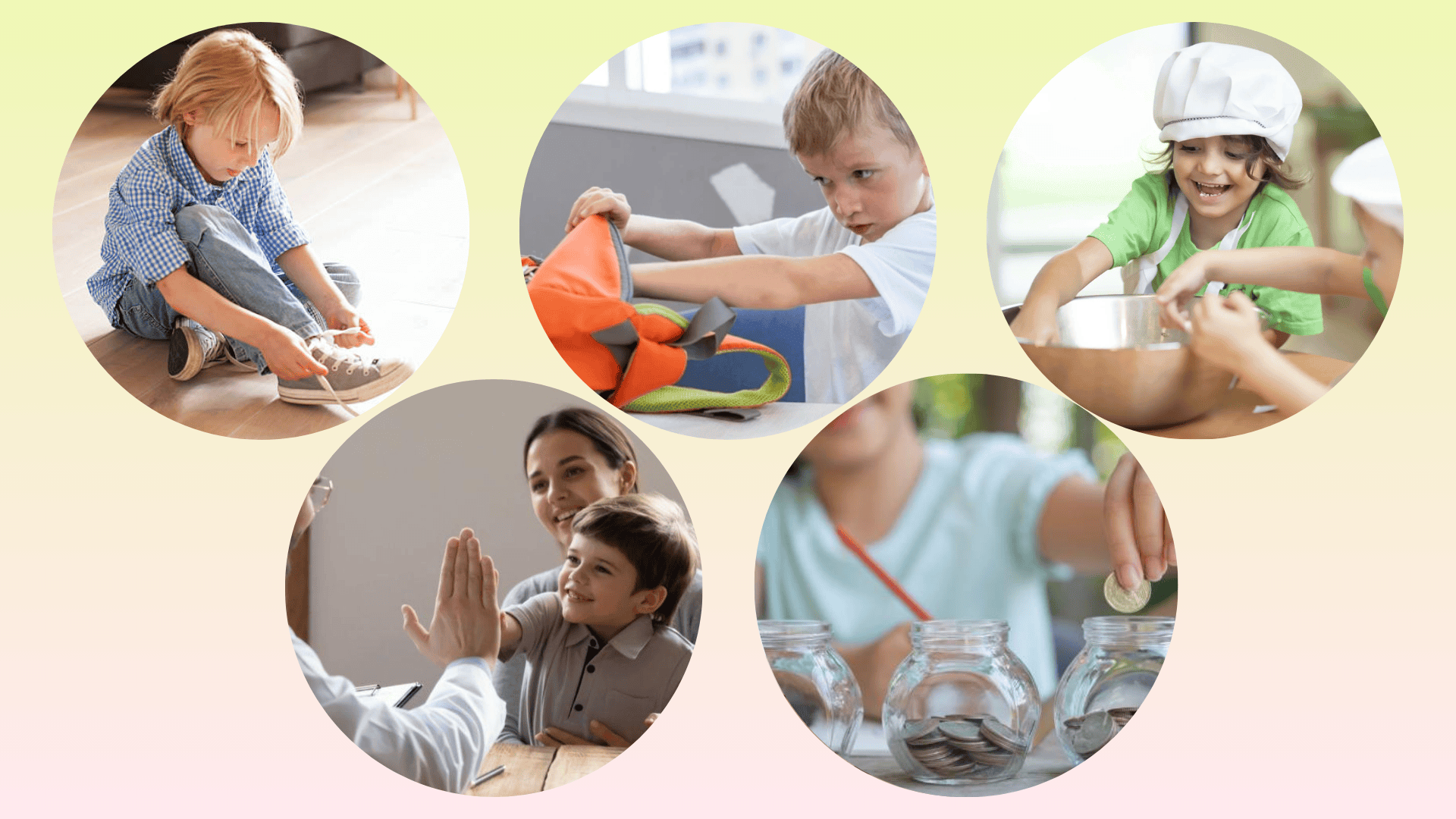
Kids gain independence and teamwork skills through basic chores, routines, and social interactions.
- Dressing Independently: Choosing and buttoning clothes builds self-reliance. Example: getting ready for school alone strengthens independence, confidence, and responsibility for daily personal care.
- Tying Shoelaces: Learning to tie shoelaces improves patience and motor skills. Example: tying before school shows determination, focus, and pride in completing tasks independently.
- Packing a School Bag: Preparing essentials builds memory and organization.
Example: remembering lunch and homework teaches planning, accountability, and readiness for school. - Simple Cooking: Preparing small foods builds early confidence. Example: spreading peanut butter teaches safety, coordination, and independence in the kitchen.
- Setting the Table: Organizing plates and utensils teaches teamwork. Example: setting correctly fosters responsibility, awareness, and contribution to family routines.
- Polite Greetings: Respectful greetings build confidence and manners. Example: saying hello to visitors teaches courtesy, social ease, and a positive impression.
- Sharing Responsibilities: Helping with small chores develops teamwork. Example: feeding a pet shows accountability, care, and dependability at home.
- Following Safety Rules: Practicing safety builds caution and awareness. Example: looking both ways before crossing teaches focus, responsibility, and accident prevention.
- Basic Counting Money: Learning About Coins Introduces Financial Basics. Example: counting pocket money teaches value, math skills, and decision-making.
- Caring for Belongings: Respecting Items Builds Responsibility. Example: returning crayons to a box teaches organization, appreciation, and tidiness.
Early Teens Between 8–10

Children grow in independence, accountability, and critical thinking while balancing school, chores, and social skills.
- Budgeting Allowance: Saving part of your allowance helps with planning. Example: saving money aside teaches patience, self-control, and thinking about the future.
- Doing Chores: Completing tasks builds responsibility. Example: Vacuuming on your own shows teamwork, accountability, and helping the household.
- Reading Simple Recipes: Following recipes builds literacy and independence. Example: making pancakes teaches patience, focus, and cooking confidence.
- Time Management: Prioritizing schoolwork teaches organization. Example: finishing homework before watching TV ensures a balance between duties and fun.
- Personal Hygiene: Taking care of hygiene supports health awareness. Example: Showering daily shows responsibility and discipline.
- Conflict Resolution: Handling disagreements calmly builds maturity. Example: talking through fights with siblings teaches communication and compromise.
- Writing Thank-You Notes: Showing gratitude builds empathy. Example: Writing notes for birthday gifts shows kindness, thoughtfulness, and good manners.
- Taking Care of a Pet: Pet care builds responsibility. Example: Feeding fish daily teaches reliability, empathy, and keeping routines.
- Responsibility for Schoolwork: Meeting deadlines teaches accountability. Example: submitting assignments on time builds trust and self-discipline.
- Understanding Needs vs. Wants: Knowing the difference shows maturity. Example: choosing water over soda teaches smart choices, self-control, and prioritizing health.
Teenagers in 11–13
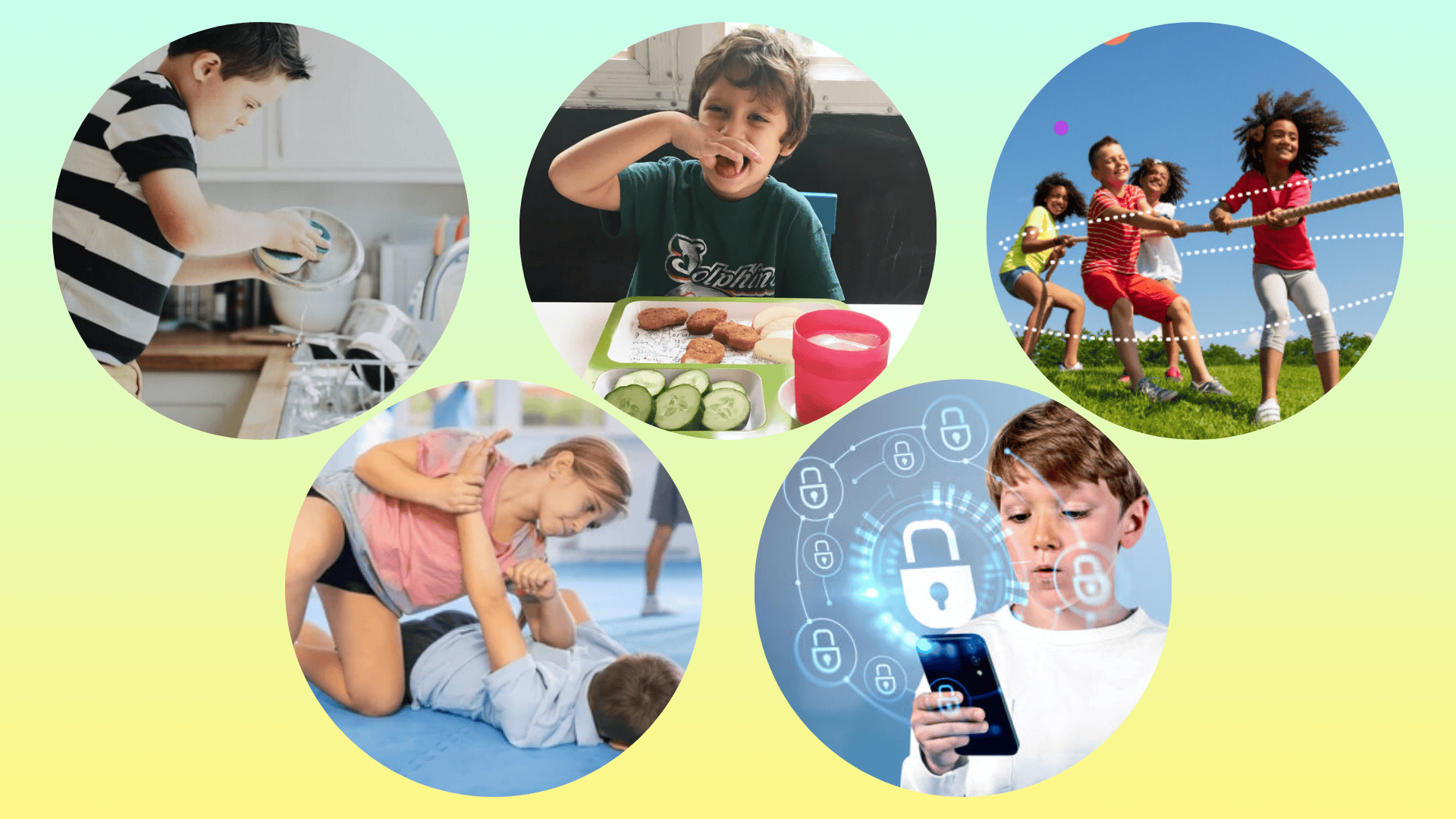
Preteens develop maturity, independence, teamwork, and digital awareness as they manage routines and responsibilities.
- Managing Chores Alone: Doing household tasks without help teaches independence. Example: completing laundry from start to finish prepares children for adult responsibilities and self-sufficiency.
- Planning Meals: Planning meals encourages organization. Example: making a grocery list teaches foresight, responsibility, and healthy eating habits.
- Independence in Routines: Managing daily routines builds maturity. Example: waking up with an alarm develops accountability, discipline, and personal independence.
- Conflict Resolution: Negotiating calmly prevents fights. Example: resolving sibling arguments teaches fairness, compromise, and respectful communication.
- Teamwork in Projects: Working collaboratively builds cooperation. Example: contributing equally to group school projects teaches accountability, fairness, and the value of shared success.
- Self-Defense Basics: Understanding self-protection improves safety. Example: saying no or seeking help prevents harm, builds awareness, and fosters confidence.
- Internet Awareness: Safe Online Habits Reduce Risks. Example: not sharing passwords teaches caution, responsibility, and digital awareness.
- Time Prioritization: Balancing tasks teaches organization. Example: scheduling homework and sports helps build responsibility and structure.
- Speaking Respectfully: Using polite words fosters respect. Example: Addressing teachers kindly shows courtesy, self-control, and maturity.
- Coping with Peer Pressure: Refusing Unsafe Behaviors Builds Confidence. Example: declining dares teaches independence, assertiveness, and strong decision-making.
Late Teenagers 14–18

Teens prepare for adulthood with advanced independence, financial awareness, career readiness, and strong emotional skills.
- Budgeting Money: Tracking expenses develops financial responsibility. Example: recording weekly spending builds awareness, discipline, and control over one’s finances.
- Applying for Jobs: Writing resumes builds professionalism. Example: preparing applications teaches confidence, responsibility, and career readiness.
- Interview Skills: Practicing answers builds readiness. Example: mock interviews improve confidence, communication, and professionalism.
- Digital Safety: Protecting privacy prevents risks. Example: avoiding oversharing teaches responsibility, safety, and digital discipline.
- Healthy Friendships: Choosing supportive friends builds wellbeing. Example: surrounding themselves with kind peers fosters trust, respect, and encouragement.
- Driving Basics: Learning road rules fosters safety. For example, understanding signs prepares you for independence and responsible driving.
- Goal Setting: Planning goals creates focus. Example: outlining career steps teaches vision, responsibility, and persistence.
- Stress Management: Healthy coping methods reduce anxiety. Example: exercising regularly eases exam pressure, improves health, and builds resilience.
- Cooking Full Meals: Cooking meals develops independence. Example: preparing pasta teaches confidence, responsibility, and essential adult skills.
- Volunteer Work: Helping others builds empathy. Example: volunteering at events fosters contribution, compassion, and social responsibility.
Advanced Teen Skills
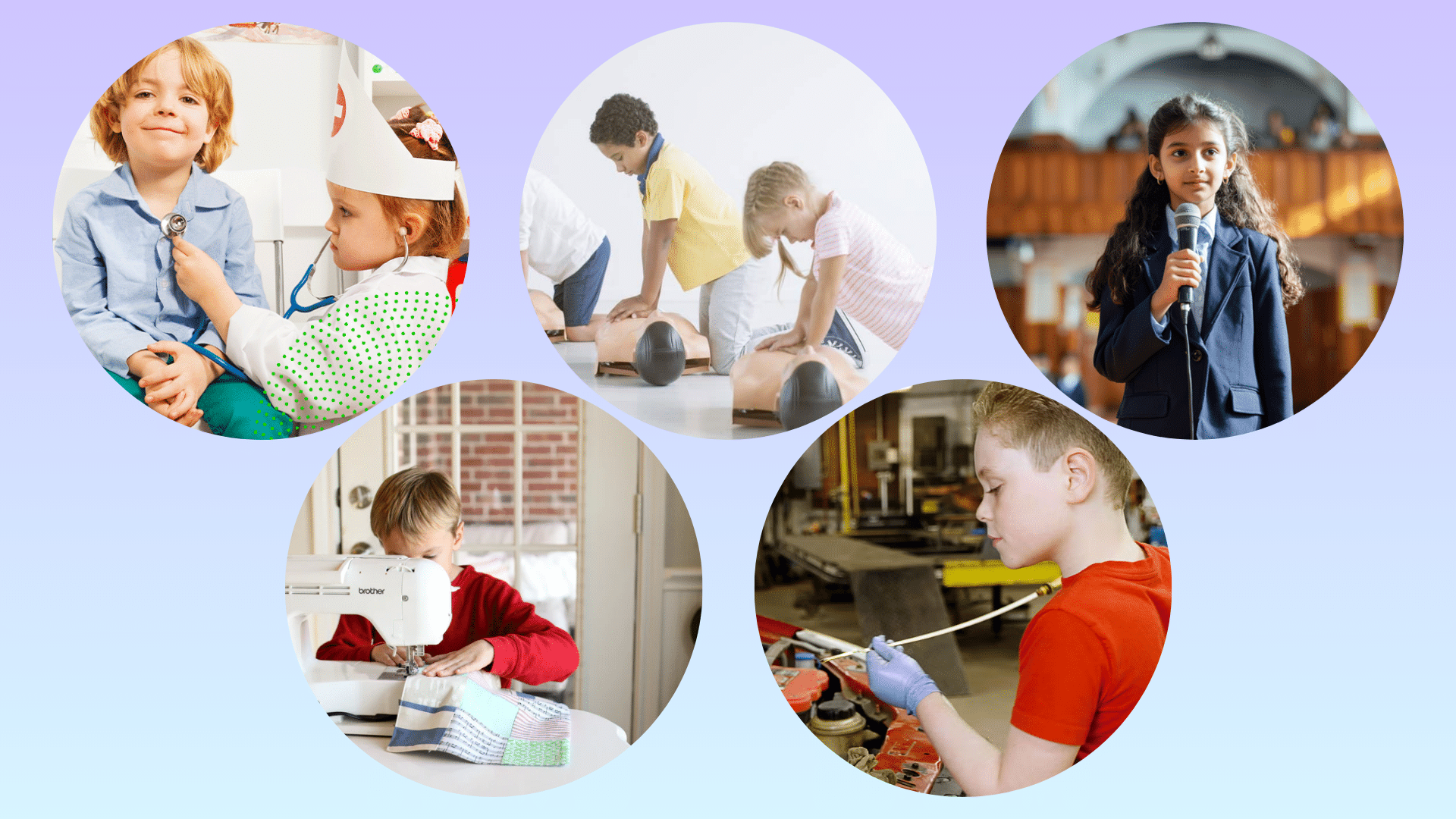
Older teens develop confidence, professionalism, independence, and leadership skills that prepare them for adult life.
- Basic First Aid: Knowing how to clean cuts and apply bandages helps teens stay calm during small emergencies while waiting for medical help.
- CPR Awareness: Learning the basics of CPR and how to call emergency services gives teens life-saving knowledge, even if they can’t perform full procedures.
- Public Speaking: Talking with confidence in front of others boosts self-esteem, improves communication, and prepares teens for school or a future job.
- Critical Media Literacy: Checking online news, posts, and ads helps teens spot misinformation, think critically, and make better choices.
- Writing Emails: Sending clear and respectful messages builds professionalism. For example, emailing a teacher politely prepares them for future education or work.
- Basic Sewing: Fixing a button or small tear teaches patience and independence. It also shows that repairing can be smarter than replacing.
- Car Maintenance Basics: Checking tire pressure, adding windshield fluid, and understanding dashboard signals help teens drive safely and care for their car.
- Managing Screen Time: Setting limits for phones and games builds balance, lowers stress, and encourages offline activities.
- Healthy Eating Habits: Choosing nutritious foods supports energy and long-term health. For example, balancing vegetables, protein, and snacks teaches smart choices.
- Respecting Diversity: Valuing cultural differences builds empathy. For example, respecting a peer’s traditions encourages inclusion and kindness.
- Negotiation: Finding fair solutions teaches compromise. For example, working out curfews with parents builds trust and stronger communication.
- Self-Advocacy: Speaking up for personal needs teaches courage and independence. Example: Asking teachers for help develops responsibility and supports learning.
- Basic Mindfulness: Practicing breathing exercises helps reduce stress and improve focus. Example: using mindfulness before exams helps teens remain calm and clear-headed under pressure.
- Safe Travel Skills: Learning to navigate buses, trains, or ride-shares responsibly builds independence, increases safety awareness, and ensures teens travel confidently on their own.
- Work Ethic: Being reliable in school or jobs teaches discipline. For example, showing up on time builds trust and responsibility.
- Entrepreneurship Basics: Starting small ventures, such as selling crafts, introduces teens to budgeting, innovation, customer service, and overcoming challenges in managing profits and responsibilities.
- Networking: Meeting people and forming connections opens doors. For example, introducing themselves at events builds confidence and future opportunities.
- Leadership: Guiding groups builds accountability. Example: leading a project team teaches decision-making, motivation, and responsibility for shared success.
- Conflict Mediation: Helping peers resolve disputes teaches fairness. Example: suggesting compromises strengthens communication and nurtures harmony in relationships.
- Long-Term Planning: Setting goals for the next five years builds focus. For example, mapping steps for college teaches direction and responsibility.
Adult-Prep & General Life Skills
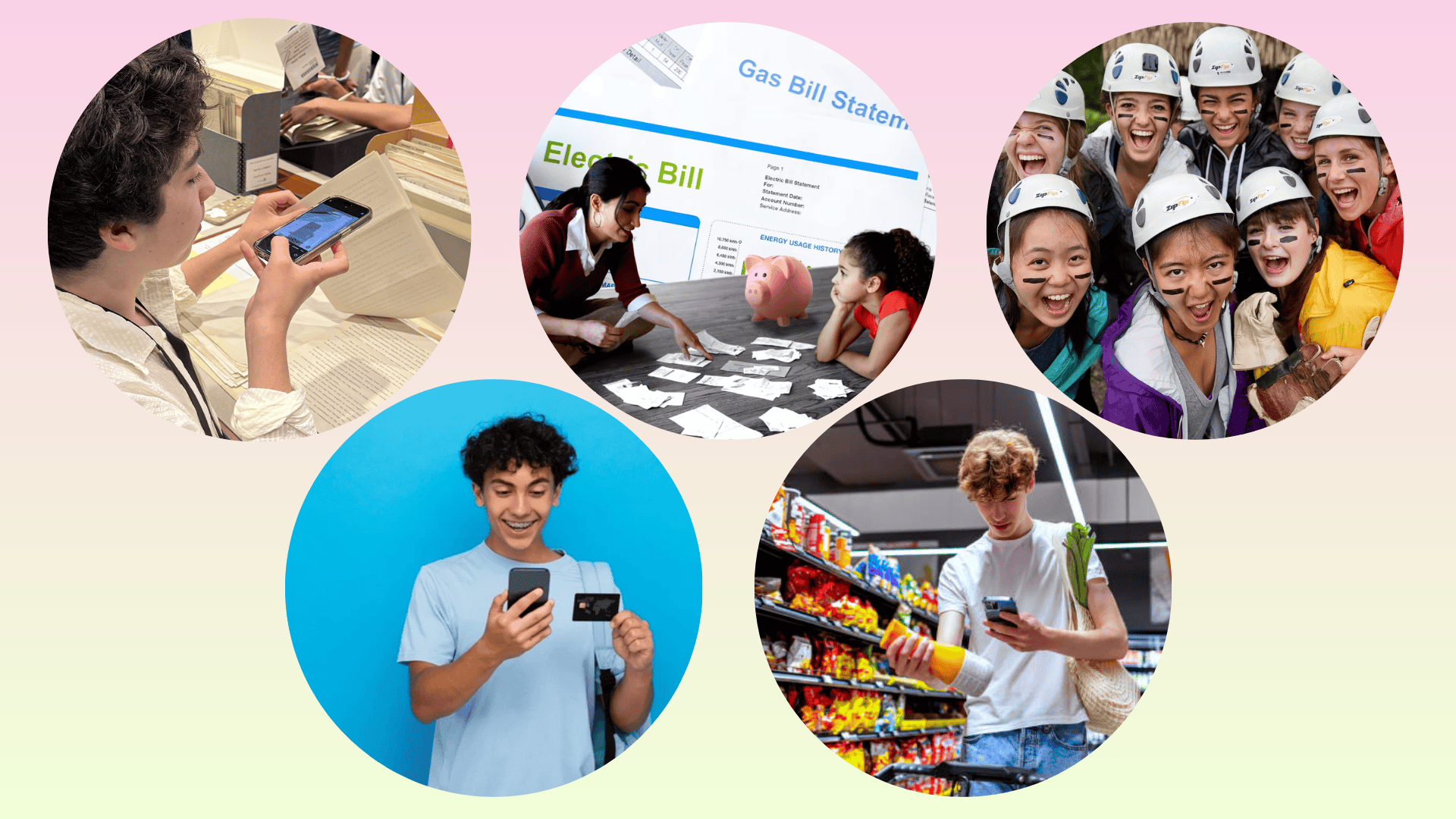
Practical skills prepare young adults for independence, responsibility, and real-world challenges.
- Filing Documents: Keeping important papers such as IDs, bills, and contracts organized builds independence, prevents stress, and ensures quick access for school, work, or emergencies.
- Understanding Taxes: Learning how income taxes and deductions work helps young adults manage earnings responsibly, avoid surprises, and prepare for financial responsibilities in adulthood.
- Paying Bills: Handling rent, electricity, or phone payments teaches responsibility, avoids late fees, and builds financial discipline.
- Using Banking Tools: Learning to use ATMs, debit cards, and apps makes money management easier and prevents mistakes.
- Credit Basics: Understanding loans, debt, and credit scores teaches responsibility, highlights long-term impacts, and helps avoid traps created by careless borrowing.
- Renting Essentials: Reading and understanding lease terms teaches tenants their rights, prevents confusion, and supports independent living.
- Basic Household Repairs: Fixing small issues, such as leaky faucets or loose screws, saves money, encourages problem-solving, and builds confidence in maintaining a home.
- Cleaning Routines: Following weekly cleaning schedules prevents clutter, reduces stress, supports health, and teaches young adults the value of an organized living space.
- Grocery Shopping: Comparing prices, reading labels, and making lists teaches budgeting, supports healthy eating, and smart shopping.
- Meal Planning: Planning meals in advance saves money, prevents food waste, and ensures balanced nutrition, while also teaching responsibility and independence in food preparation.
- Emergency Preparedness: Knowing what to do during storms, fires, or power outages builds safety awareness, confidence, and a sense of responsibility for protecting oneself and others.
- Voting Awareness: Understanding elections, candidates, and civic responsibilities encourages participation, builds responsibility, and ensures informed contributions to democratic communities.
- Insurance Basics: Recognizing the importance of health, auto, or renters’ insurance prepares young adults for unexpected events and teaches smart financial planning.
- Workplace Etiquette: Following dress codes, manners, and respectful communication, maintaining professionalism, and career growth.
- Time Blocking: Organizing daily schedules into focused blocks reduces procrastination, increases productivity, and helps balance personal, school, and work responsibilities effectively.
- Emotional Regulation: Managing emotions with tools like deep breathing reduces conflict and improves relationships.
- Self-Reflection: Journaling or reflecting on experiences fosters self-awareness, enhances decision-making, and promotes continuous personal growth throughout adulthood.
- Healthy Boundary Setting: Saying no when needed prevents burnout and builds healthier relationships.
- Stress Relief Hobbies: Engaging in creative or physical hobbies, such as painting, sports, or gardening, can help reduce stress, improve mental health, and foster healthy coping habits.
- Travel Planning: Researching destinations, booking tickets, and budgeting for trips builds independence, organizational skills, and responsibility in managing travel safely.
- Cultural Etiquette: Respecting customs around the world builds adaptability and positive interactions with others.
- Self-Motivation: Building inner drive teaches persistence, discipline, and independence by ensuring progress continues even without external guidance or encouragement.
- Civic Awareness: Understanding local laws, safety rules, and civic duties fosters a sense of responsibility and awareness of how personal actions impact broader communities.
- Professional Communication: Writing polite emails, reports, and workplace messages builds credibility, strengthens professionalism, and supports success in higher education or careers.
- Digital Organization: Maintaining orderly files, backing up data, and managing secure passwords ensures safety, prevents data loss, and fosters responsible technology use.
- Career Focus: Researching job fields, internships, and skill requirements fosters awareness, promotes planning, and enables young adults to make informed and confident career choices.
- Healthy Relationship Skills: Respecting boundaries, listening actively, and practicing effective communication foster trust, mitigate conflict, and promote supportive and safe relationships.
- Parenting Awareness: Understanding childcare basics, such as feeding, safety, and emotional needs, prepares young adults for potential future parenting and nurtures empathy.
- Lifelong Learning: Pursuing new knowledge through books, online courses, or experiences fosters adaptability, keeps the mind active, and supports personal growth over time.
- Community Involvement: Participating in volunteer projects or local groups helps develop empathy, fosters a sense of belonging, and encourages meaningful contributions to society.
Challenges Parents Face (and Solutions)
Teaching kids new skills isn’t always easy, especially with busy schedules and short attention spans. Simple strategies can make the process smoother for both parents and children.
| Strategy | How It Helps |
|---|---|
| Short daily lessons during routines | Creates natural learning moments without extra time commitment |
| Games, rewards, and checklists | Boosts motivation and keeps practice fun |
| Letting children choose skills | Builds engagement and ownership |
| Age-appropriate, step-by-step goals | Reduces stress and keeps progress realistic |
| Calm demonstrations and limited choices | Eases resistance and frustration |
| Family progress charts | Encourages steady growth and celebrates effort |
With small adjustments, parents can guide skill-building in a positive way. These little steps add up to big progress and support lifelong learning.
Conclusion
Teaching life skills is one of the most valuable gifts we can give children. These skills build independence, confidence, and resilience that will guide them through school, friendships, and adulthood.
Simple lessons, like managing time, caring for belongings, or handling emotions, shape habits that last a lifetime.
I believe small daily efforts matter more than big, overwhelming lessons. By starting early and staying consistent, parents can make learning natural and stress-free.
Every step, no matter how small, brings children closer to becoming capable, thoughtful, and responsible adults. Begin with just one or two skills this week and watch the progress grow.
Share your own experiences or favorite life skill tips in the comments – I’d love to hear them.


